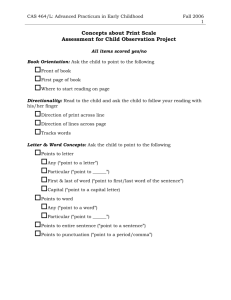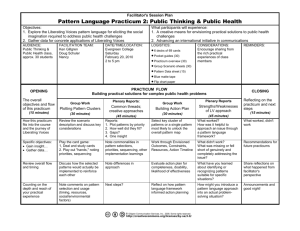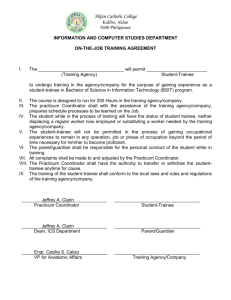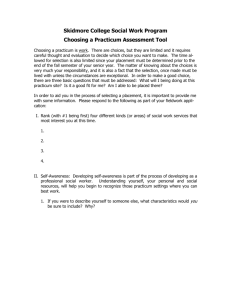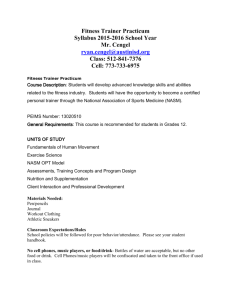1 Dear child life practicum applicant, Our philosophy
advertisement
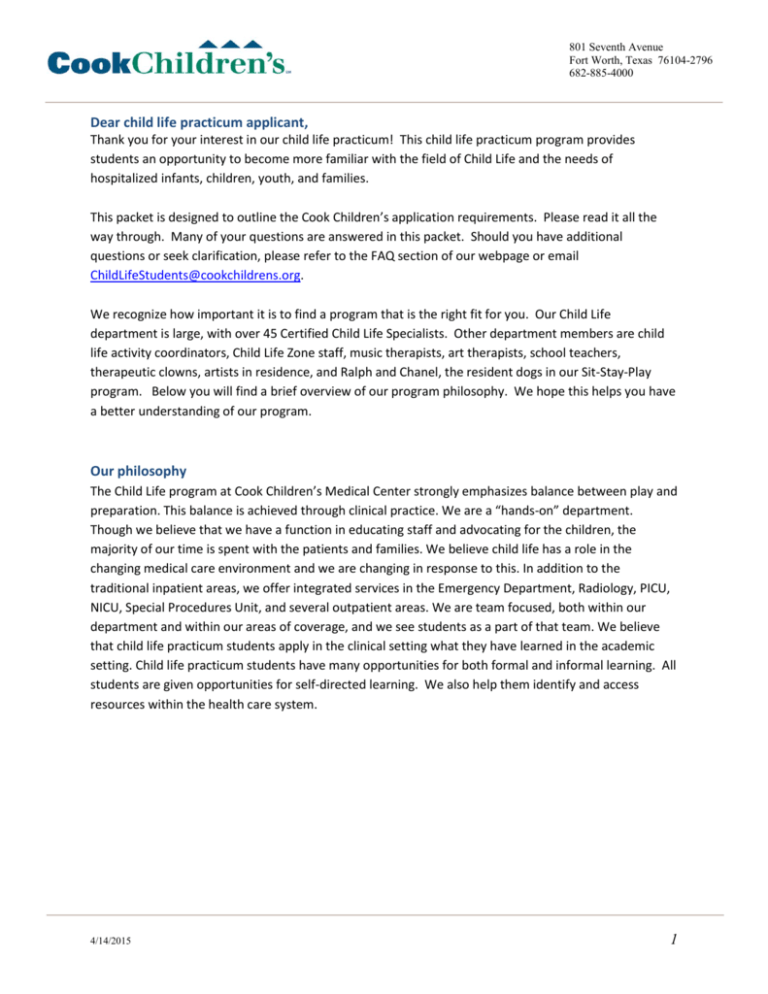
801 Seventh Avenue Fort Worth, Texas 76104-2796 682-885-4000 Dear child life practicum applicant, Thank you for your interest in our child life practicum! This child life practicum program provides students an opportunity to become more familiar with the field of Child Life and the needs of hospitalized infants, children, youth, and families. This packet is designed to outline the Cook Children’s application requirements. Please read it all the way through. Many of your questions are answered in this packet. Should you have additional questions or seek clarification, please refer to the FAQ section of our webpage or email ChildLifeStudents@cookchildrens.org. We recognize how important it is to find a program that is the right fit for you. Our Child Life department is large, with over 45 Certified Child Life Specialists. Other department members are child life activity coordinators, Child Life Zone staff, music therapists, art therapists, school teachers, therapeutic clowns, artists in residence, and Ralph and Chanel, the resident dogs in our Sit-Stay-Play program. Below you will find a brief overview of our program philosophy. We hope this helps you have a better understanding of our program. Our philosophy The Child Life program at Cook Children’s Medical Center strongly emphasizes balance between play and preparation. This balance is achieved through clinical practice. We are a “hands-on” department. Though we believe that we have a function in educating staff and advocating for the children, the majority of our time is spent with the patients and families. We believe child life has a role in the changing medical care environment and we are changing in response to this. In addition to the traditional inpatient areas, we offer integrated services in the Emergency Department, Radiology, PICU, NICU, Special Procedures Unit, and several outpatient areas. We are team focused, both within our department and within our areas of coverage, and we see students as a part of that team. We believe that child life practicum students apply in the clinical setting what they have learned in the academic setting. Child life practicum students have many opportunities for both formal and informal learning. All students are given opportunities for self-directed learning. We also help them identify and access resources within the health care system. 4/14/2015 1 All required items must be submitted in one envelope in order for your application to be considered complete. All envelopes must be postmarked by the deadline date. Remove all staples and paperclips. Submit only single-sided copies of documents, when within your control. (This helps us save trees later in our process.) Follow all application instructions correctly. A cover letter is acceptable; however, please do not include additional items not specifically requested. 4/14/2015 2 Program Information We offer the child life practicum three times a year beginning in January, May, and September The child life practicum is a 13-week experience 12-16 hours/week, consisting of either two 8-hour days or one 8-hour and one 4-hour day Students will obtain between 150-200 hours of child life practicum experience Students are expected to be available for child life practicum during regular business hours Certain individual rotations may require a practicum student to work some evenings Child life practicum curriculum includes a variety of assignments Applicant Requirements Sophomore level in college or beyond Must have a minimum of 100 hours of experience interacting with children, beyond required experiences for coursework experience in an established Child Life program is preferred Relevant coursework (i.e.: child life, child development, psychology, human & family studies) GPA of 3.0 or above If the child life practicum is to be conducted for academic credit or in fulfillment of any academic requirements, it is the applicant’s responsibility to verify the child life practicum at Cook Children’s Medical Center fulfills the expectations of the academic program. If you are unsure, please email ChildLifeStudents@cookchildrens.org for clarification. Application deadlines Semester Application must be postmarked by: Initial offers will be made to students on: Student must accept position by: Winter/Spring September 19 4th Tuesday of October the next day Summer January 19 4th Tuesday of February the next day Fall May 19 4th Tuesday of June the next day **In the event that the application deadline falls on a weekend or holiday, the next business day will become the deadline. Application and required documentation should be submitted to: Linsey Hammon, MS, CCLS Education department Cook Children’s Medical Center 801 Seventh Avenue Fort Worth, TX 76104 4/14/2015 3 Application Submission Requirements Cook Children’s Child Life Practicum application Cook Children’s essay question responses (questions are on the second page of the application) Your essay responses must not include any identifying information. Do not include your name, the name of your school, or the name of the instructor who taught your child life class. All academic transcripts; unofficial transcripts are acceptable Two letters of recommendation At least one must be from someone who supervised and/or observed you interacting with children All letters must be in signed/sealed envelopes Professional résumé Application reminders Late or incomplete applications will not be considered Applicants who do not follow the instructions will not be considered Each application will be examined to ensure that the student meets the program’s basic requirements Submitting a completed application does not guarantee a student an interview or placement To confirm receipt of your application, use an expedited, traceable mail service or the postal service's delivery confirmation. To confirm receipt of your application, use an expedited, traceable mail service or the postal service's delivery confirmation – emails requesting confirmation of receipt ma not receive a reply Remove all staples and paperclips Avoid sending double-sided documents – documents you receive from a 3rd party (i.e.: transcripts) that are already double-sided are fine Interview information Only the most qualified of the applicants will be offered interviews An on-site interview is preferred, though phone or Skype interviews are allowed due to travel constraints It works to your benefit as a candidate to participate in an on-site interview. This allows you to see our program and for our interview committee to get a better understanding of your strengths We interview between eight and ten students each semester 4/14/2015 4 Additional student requirements – to be completed once accepted into the child life practicum program Clear criminal background check Current negative drug screen Current negative TB Test American Heart Association Healthcare Provider CPR certification General volunteer orientation Patient care volunteer orientation Current health insurance Proof of individual liability insurance or coverage by university Signed individual educational experience agreement (when practicum is not for school credit) Signed affiliation agreement between university and Cook Children’s (when practicum is done for school credit) Signed release of liability If you have additional questions, please contact: ChildLifeStudents@cookchildrens.org or call Linsey Hammon at 682-885-4504 4/14/2015 5 Child life practicum program goals 1. 2. 3. 4. Enrich rapport building skills. Introduce child life services Develop, implement, and adapt activities Enhance observation skills The child life practicum student is exposed to the child life profession through observation and participation in child life activities. This exposure is designed to prepare the child life practicum student for a more intensive, career-oriented training experience (internship). Through observation of child life professionals and hospitalized children and teens, active participation in various areas of programming, and ongoing supervision and feedback, the student will integrate knowledge with practice as she or he... 1. Becomes familiar with the child life profession. 2. Develops communication skills with children/families in the health care setting, as well as with other health care professionals. 3. Recognizes and understands children's/adolescent's reactions to stress, illness, and pain. 4. Recognizes the value of play and psychosocially supportive interventions. 5. Learns to plan and facilitate a variety of activities for groups of children of diverse ages and capabilities, as well as for individual children or teens and practices these skills in activity centers and at bedside. 6. Gains knowledge of medical terminology, diagnoses, and procedures. 7. Sets goals for learning and evaluates own performance. 8. Begins to develop professional attitudes, growth, maturity, and judgment by functioning as a member of the health care team. Specific expectations will be reviewed during program orientation. 4/14/2015 6
